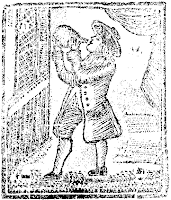
Yesterday’s
Boston Globe included an
article by Francie Latour rounding up several books and a movie issued over the past decade about
slavery in New England. It offers a good reading list on the subject, including Elisa Lemire’s
Black Walden (and avoiding one unreliable recent title).
The article’s subhead says, “More than we like to think, the North was built on slavery”; a bunch of right-wing commenters confirmed that by showing that they’d prefer not to see such essays at all.
I have my own objection to how the article begins:
In the year 1755, a black slave named Mark Codman plotted to kill his abusive master.
The name “Mark Codman” pulled me up short because that’s not how the man was referred to in his lifetime.
John Codman called his slave “Mark,” with no surname. Massachusetts society and legal practices followed suit.
Mark was tried, convicted, and executed under that single name. Referring to blacks by only a given name was undoubtedly a way to signal their lesser status in colonial society. But tacking on their owners’ surnames now strikes me as, in its small way, both a distortion of that history and another imposition on those individuals.
In many cases, we know that people who had been enslaved adopted the surnames of their former masters: Tony Vassall of
Cambridge,
Prince Estabrook of
Lexington,
Phillis Wheatley of Boston until her marriage to John Peters, and so on. But in other cases, enslaved people used surnames that differed from their owners’ or former owners’.
Crispus Attucks’s last name hints at a connection to the
Natick Indians.
Peter Salem also went by the name Salem Middlesex; he apparently took surnames from locations rather than from his one-time owners, Jeremiah Belknap and Lawson Buckminster.
In
Framingham in 1721, two African-born slaves of the Rev. John Swift married. They are listed in church records as Nero Benson and Dido Dingo, the latter sounding more like an African name than an English one. Subsequent legal records usually refer to this couple by their first names only, but the surname “Benson” got passed down to their free descendants. (In Maryland later,
Frederick Douglass was born Frederick Bailey, and never knew where his original surname came from—clearly not his or his mother’s owner. William S. McFeely’s biography suggests it might be a form of “Belali,” a common African name.)
Sally Hemings’s surname came from the ship’s captain who owned one of her ancestors and fathered another. The Hemings family retained that surname for generations despite owners like
Thomas Jefferson usually referring to them only by given names. (Even today, one can often detect writers who want to dismiss Sally Hemings and her descendants’ link to Jefferson by how they refer to her only as “Sally,” or spell the name “Hemmings” as a white Jefferson biographer did.)
Being able to control their own names appears to have been significant for African-Americans. Gary Nash showed in a study of Philadelphia that emancipated black families quickly dropped the classical, geographic, and African day-names that colonial slave-owners liked—no more Pompey, Bristol, or Cuffee. Free blacks instead favored Biblical and common English names, like most of their neighbors.
Given those patterns, I always look for the name that an enslaved or formerly enslaved person appears to have freely chosen and preferred, and to try to use it in the same style as I would for white contemporaries: Attucks, Wheatley, Hemings, &c. (
Olaudah Equiano presents a difficult case.) But when I can’t find a surname, I don’t add an owner’s surname because I’ve seen enough examples of individuals choosing otherwise. And recognizing people as individuals is what naming is all about.
I can therefore see the motive to give Mark a surname like most of his Massachusetts contemporaries. But he suffered at the hands of John Codman, and killed the man. Would he really want to be retroactively named “Mark Codman”? Enslavement constricted Mark’s life and treated him as less than fully human; the fact that he was called only “Mark” is a significant reflection of that history.












